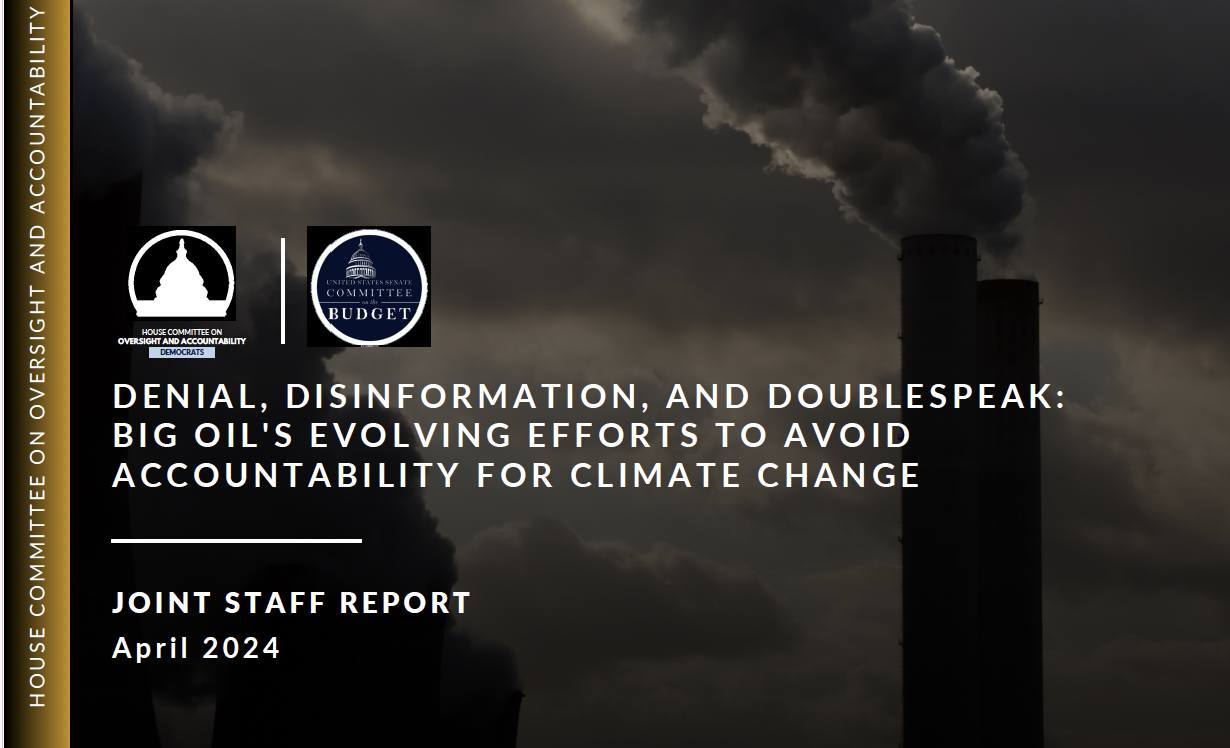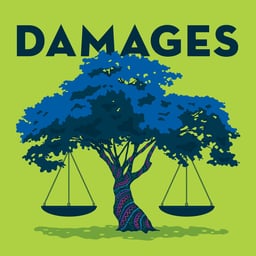
Bolstered by new revelations about the oil and gas industry’s work to downplay and obstruct climate action, Democrats sharpened their arguments against Big Oil in a pair of Senate Budget committee hearings on Wednesday.
In the first part of the day, the star witness House Oversight Chair Jamie Raskin (D-MD) said that documents obtained during a joint investigation between House Oversight Committee Democrats and the Senate Budget Committee show Big Oil “acted in a reckless way to protect their profits.” In the second panel, a former federal litigator who led tobacco prosecution said there is more than enough evidence compiled by the Committees for the Department of Justice to get involved.
The hearing, chaired by Sen. Sheldon Whitehouse (D-RI), zeroed in on the industry’s “denial, disinformation, and doublespeak.” It builds off of a new 65-page bicameral report and 4,500 new documents subpoenaed from the fossil fuel industry. These include internal climate communications and presentations from ExxonMobil, BP, Chevron, Shell, the American Petroleum Institute, and the Chamber of Commerce, dating from just before the Paris agreement adoption in 2015 to the end of 2021.
The House Oversight Committee’s Democratic majority began this investigation three years ago, holding a hearing where oil executives testified. But House Democrats were frustrated by how few documents they received. The Oversight Committee issued a flurry of subpoenas requiring internal memos, presentations, correspondence, sharing the task with the Senate when Democrats lost their House majority.
There is now an extensive paper trail, compiled by researchers and journalists in recent years, dating back to the 1950s on the oil and gas industry’s role in obstructing climate action. However, the bulk of these documents have often covered decades-old events. This new tranche is related to more recent policy debates, including frank exchanges on rising methane emissions, the role of carbon capture and storage, and the industry’s influence at top universities.
Here are some of the highlights of the day.
Oil companies “focused on things we know can’t be done”
In the first hearing, Raskin explained one of the key insights from the investigation — that marketing and public perception have been major preoccupations for the industry, with public statements and messaging often contradicted by their internal discussions.
One of the examples Raskin cited was Exxon’s now-defunct scheme to make algae-based biofuels. This was a tiny program in Exxon’s budget, and the company spent roughly half as much on advertising the program as it did on research and development. But the point was the attention, not the impact on emissions.
One of the advertising campaigns marketed algae on social media to children. “Kids is an over-performer in terms of our content,” a digital and social media manager wrote in an email circulated among Exxon’s Public and Government Affairs team. “It humanizes ExxonMobil and is in an unexpected format.”
Oil companies have also treated carbon capture utilization and storage (CCUS) as a “shiny flashy object,” according to Raskin. Internally though, company employees messaged that CCUS, a process of capturing carbon dioxide and injecting it underground, isn’t viable. A 2016 presentation for BP noted the technology “has stalled and commercial deployment is very limited.”
There’s a pattern here, Raskin said, where the oil industry touted empty solutions as a way of delaying a transition to solar and wind. “Big oil companies, rather than focus on what we know we can do, focus on things we know can’t be done,” he said.
“Lying to us” on methane
Senator Ben Ray Luján (D-NM)’s home state contains part of the Permian Basin, one of the biggest methane-emitting regions in the world. His questioning focused on the industry’s promotion of methane, charging the industry with “lying to us.”
The documents reveal differences between how the industry viewed and marketed natural gas. Since the Paris agreement, scientists have shown repeatedly how methane leaks from oil and gas operations are worse than previously estimated, creating a major image problem for companies that depend heavily on selling natural gas.
Still, publicly, the industry has promoted methane as clean and harmless.
One 2018 draft presentation described BP’s communications campaign to “advance and protect the role of gas.” It described gas as a destination fuel and discussed a campaign that would “‘Harness excitement’ around renewables by positioning gas as the perfect partner.”

Internal communications offered conflicting messages. When BP’s then-CEO was going to make a speech on “Biggest Challenges and Opportunities Facing the Global Gas Industry,” employees debated the nuances. A comment made on a draft speech undermined the idea that gas is clean, noting, “All the models with a continuing role for gas see wide CCUS deployment.”
GOP climate denial on full display, again
The Republican response to the hearing and report? They insist there is nothing new to see here.
Some GOP senators used their time to platform repeatedly debunked climate change denial. Sen. Ron Johnson (R-WI), at one point called himself a “climate realist,” carbon dioxide “plant food,” and said there is “literally nothing we can do about this.”
Senate Budget Ranking Member Sen. Chuck Grassley (R-IA), for his part, called the hearing a spectacle , and took issue with the process, saying the minority received notice of the documents over the weekend.
Oil companies targeted by the subpoena have also said there is nothing new to this investigation. Reached for comment, Shell spokesperson Curtis Smith said the documents “are evidence of Shell’s efforts to set realistic targets, hi-grade its portfolio and meaningfully participate in the energy transition. Within that pursuit are internal and external discussions that signal Shell’s intent to form partnerships and share pathways we deem critical to delivering more value with fewer emissions.”
However, details do matter, and can make waves. Many of the revelations revolve around the close ties academic institutions have with the oil industry, and the industry’s motives in funding university programs. The industry received preferential treatment from some, like Stanford University’s Energy Modeling Forum, including prepublication access to studies,, “expeditious access to the Forum’s staff” and special meetings “focused on policy implications of our work.” Stanford University told E&E News that the industry’s access “appears to be inconsistent with our policies regarding industrial affiliates programs and openness in research.”
The exposure of industry access like at Stanford can be fodder in the ongoing campus efforts to pressure institutions to cut funding from fossil fuels and divest.
The bigger impact, though, might not be in academia but the courtroom.
This hearing may help build the legal case against Big Oil.
The congressional investigation could very well play a role in ongoing litigation against the oil and gas industry.
University of Miami professor Geoffrey Supran, an oil disinformation expert, noted the parallels between the oil industry’s campaign on fossil fuels and tobacco’s on smoking risks. Like tobacco, accountability “came as Congressional investigations – as well as legal discovery and industry whistleblowers – exposed thousands, and ultimately millions, of damning documents.”
Sharon Eubanks, a former Department of Justice litigator who prosecuted tobacco’s civil racketeering case, testified on Wednesday and said decisively there is enough evidence for the Department of Justice to get involved.
“We should not waste any more time wringing our hands about what can be done,” Eubanks said in her testimony. “There exists solid evidentiary basis to move forward with a request to the Department of Justice to investigate the actions of the fossil fuel industry.”
The Department of Justice has not weighed in on the matter, nor did it respond to a request for comment. Last July, nearly two dozen members of Congress asked the Department of Justice to look at whether major oil companies “violated federal laws and constituted a corrupt enterprise,” including racketeering.
The oil industry is fending off dozens of cases about the damages caused by their products and alleged deception. Attorneys general of eight states and the District of Columbia, as well as dozens of municipal and tribal governments, have filed lawsuits, and there are even more developing around the world.
At the hearing, Whitehouse insisted there is still work to be done. Both Raskin and the Senate Budget chair accused the companies and trade groups of obstructing the investigation, withholding and redacting thousands of pages of otherwise responsive documents.
Supran said for all the exposure of the industry’s climate campaigns, the public is “still only looking through the keyhole.”




